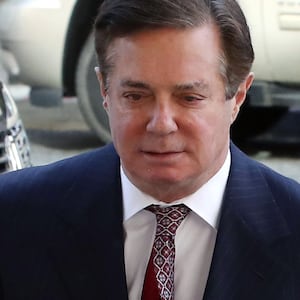Former Trump campaign chief Paul Manafort lied to prosecutors about direct contacts with senior Trump administration officials after he signed a plea agreement that has now collapsed, according to court papers filed Friday by special counsel Robert Mueller.
“The evidence demonstrates that Manafort had contacts with administration officials,” Mueller's team wrote in a memo outlining why he should be considered in breach of his deal.
He alleged:
- Manafort sent a text message in May 2018 authorizing an unnamed person to speak with a Trump official on his behalf.
- Manafort told a colleague that he had been in touch with senior administration official through February 2018.
- Documents recovered from a search of Manafort's electronics reveal additional contacts with administration officials.
Mueller also accused Manafort of deceiving Mueller’s team about his interactions with Konstantin Kilimnik and Kilimnik’s attempts to reach out to witnesses and obstruct justice on charges that the two men failed to file as foreign agents for their lobbying work.
And Manafort allegedly lied about an unspecified “investigation in another district.” In a sparse account, prosecutors say he changed his story after being presented with evidence that his earlier statements were false.
Prosecutors have homed in on Kilimnik, who was indicted alongside Manafort on obstruction of justice charges, and his relationship to people in Trump’s orbit as part of the probe into Russian interference in the 2016 election. Kilimnik, a former Russian army officer and linguist, is accused of links to Russian intelligence by Mueller.
Manafort’s alleged lies prompted the special counsel’s office to blow up a cooperation agreement which would have spared him a second trial in Washington, D.C. Manafort, already awaiting sentencing after his conviction on tax and bank fraud charges in Virginia, faced another trial on charges that he failed to register as a foreign lobbyist for his alleged work on behalf of the Ukraine in the U.S.
The relationship between the special counsel’s office and Manafort’s defense team was already strained when the plea deal fell apart because of a secret arrangement between his legal team and Trump’s.
The New York Times revealed that Manafort attorney Kevin Downing had been funneling information about the special counsel’s questions and their client’s cooperation to Trump counsel Rudy Giuliani even after Manafort had agreed to a plea deal. The move, highly unusual in federal criminal cases, offered Trump’s lawyers the chance to stay a step ahead of Mueller’s investigation and raised suspicions that Manafort was angling for a pardon.
With his plea agreement in tatters, Manafort may need a pardon as he faces the full weight of sentencing for the lobbying charges as well as his conviction on eight tax and bank fraud charges that carry a sentence of seven to ten years. Judge T.S. Ellis declared a mistrial after jurors deadlocked on the remaining 10 counts. The special counsel’s office has not yet indicated whether it plans to retry Manafort on those charges.
Manafort hid the millions he made consulting for pro-Russian Ukrainian politicians through a complex web of offshore bank accounts and shell companies. When a revolution swept Manafort’s wealthy clients from power in 2014, the former Trump campaign chairman turned to bank fraud to maintain his lavish lifestyle, marked by high-end cars and ostrich leather finery.
Rick Gates, Manafort’s former aide and a former Trump campaign staffer, testified as the Mueller team’s star witness at the Virginia trial as part of a plea deal struck with the special counsel’s office. Prosecutors have pushed back his sentencing as recently as mid-November because Gates “continues to cooperate with respect to several ongoing investigations.”
The prospect of yet more time in prison is the latest in a series of blows to Trump’s former campaign chairman, once a pioneer in the field of foreign lobbying. Manafort made an art of representing brutal dictators like Zaire’s Mobutu Sese Seko and the Philippines’ Ferdinand Marcos in search of a rebranding in Washington. Consulting for Viktor Yanukovych and Ukraine’s Party of Regions in the 2010s made Manafort richer than ever but the ouster of pro-Russian politicians from power gutted his consulting business and left him on the verge of ruin.
The Trump campaign, where Manafort lobbied hard for a job, appeared to be a lifeline that could bring clients back to his lobbying firm and restore his fortunes. But Manafort’s tenure as campaign manager was short-lived and he was fired after the Republican National Convention. His successor, Steve Bannon, was credited for bringing stability back to the campaign.
Despite his exile, Manafort still tried to profit off his connections to Trump. After the election, he suggested Federal Savings Bank CEO Steve Calk for a variety of cabinet jobs in what prosecutors said was an attempt to buy a blind eye to Manafort’ fraudulent loan application at the bank. He also reportedly told Ecuadorian officials that he could help them improve relations with the U.S. and broker a deal for the extradition of WikiLeaks founder Julian Assange from the Ecuadorian embassy in London.
Manafort remains in jail after Mueller revoked his bail prior to his Virginia conviction for witness tampering. Prosecutors say he and Kilimnik texted two witnesses in his DC trial as part of an effort “to secure materially false testimony.” Manafort, who appeared to be in fine health throughout the course of his trial, has since appeared in court sitting in a wheelchair. His attorney Kevin Downing says his client has since developed unspecified “significant issues” with his health.
Manafort is due back in court in March for sentencing.
His sentencing will be a capstone for Andrew Weissmann, a longtime federal prosecutor and top deputy to Mueller on the special counsel team. Weissmann previously prosecuted New York mafia families in the '90s, as well as Enron and its accounting firm Arthur Anderson in the early 2000s.







